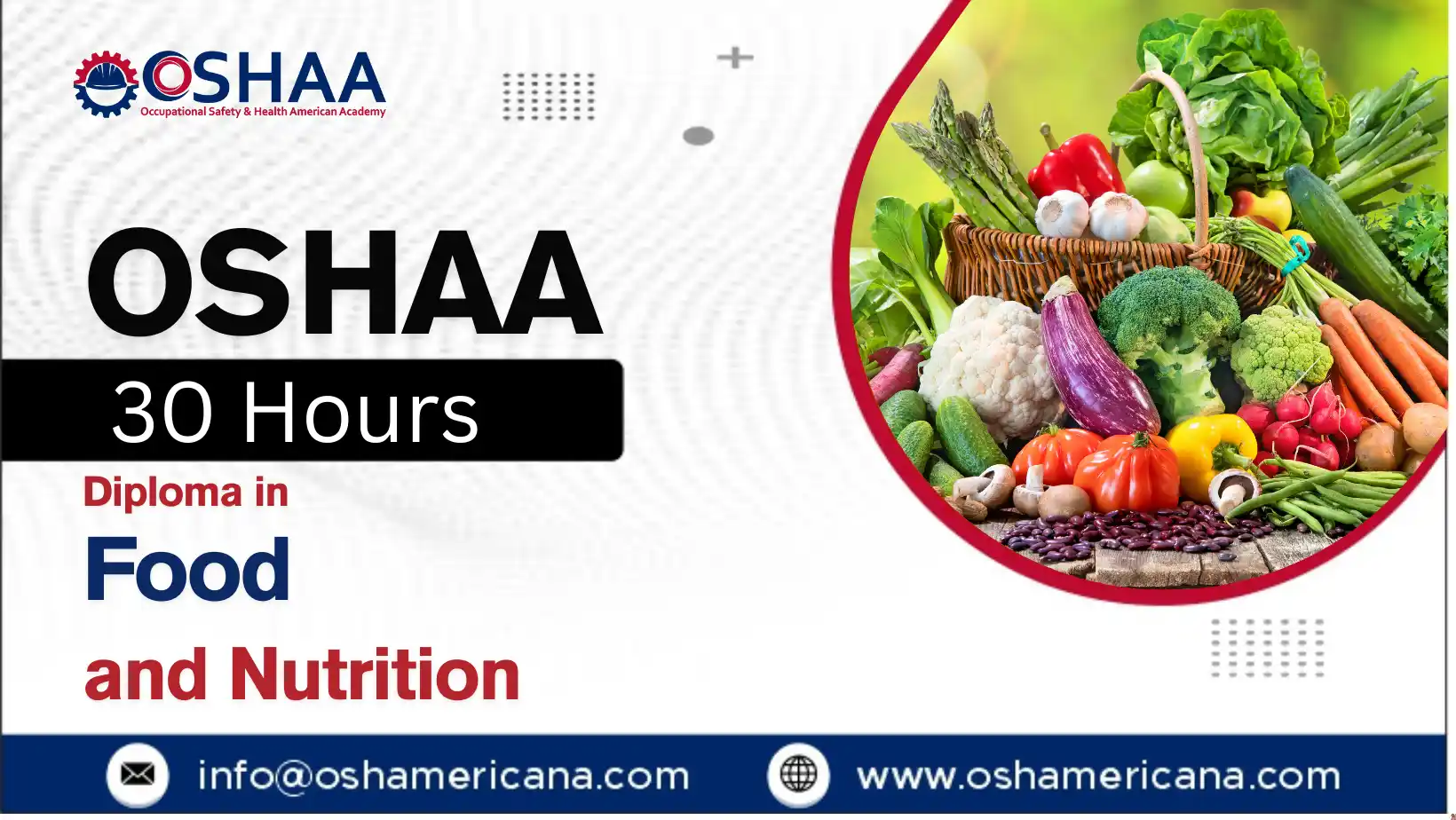The OSHAA 30-Hours Professional Diploma in Food and Nutrition is a comprehensive programme designed to provide participants with a solid foundation in the science of nutrition, dietary planning, and the role of food in maintaining health and preventing disease. This diploma is ideal for individuals seeking to deepen their understanding of nutritional principles and apply evidence-based dietary practices in both personal and professional settings.
This professionally structured diploma explores key topics in human nutrition, including macro and micronutrients, food groups, digestion and metabolism, and the impact of dietary habits on long-term health. The programme also examines the relationship between nutrition and lifestyle-related conditions such as obesity, diabetes, cardiovascular disease, and digestive disorders.
Delivered over 30 hours, the diploma integrates scientific theory with practical application, enabling participants to assess nutritional needs, make informed dietary choices, and implement nutritional strategies to support wellness across various populations.
After completing the OSHAA diploma, participants may choose to pursue further studies in specialised areas such as dietetics, sports nutrition, public health, or nutritional therapy. The qualification also serves as a stepping stone for roles that involve nutritional advising, menu planning, and community health education.
The OSHAA 30-Hours Professional Diploma in Food and Nutrition empowers participants with the knowledge and skills to make informed dietary decisions and promote healthier living. With a practical approach grounded in scientific research, this course offers a valuable opportunity for personal growth and professional enhancement in the evolving field of nutrition.
OSHAA 30-Hours Professional Diploma in Food and Nutrition
Study Units
Learning Outcomes
Introduction to Food and Nutrition Science (3 hours)
- Understand the basic concepts and scope of food and nutrition science
- Recognise the role of nutrition in human health and disease prevention
- Identify the functions of nutrients and the importance of a balanced diet
- Explore the historical and cultural influences on dietary habits
Macronutrients: Carbohydrates, Proteins, and Fats (4 hours)
- Distinguish between different types of macronutrients and their biological functions
- Analyse dietary sources and recommended intake levels of carbohydrates, proteins, and fats
- Evaluate the impact of macronutrient imbalance on health
- Understand energy metabolism and caloric values of macronutrients
Micronutrients: Vitamins and Minerals (3 hours)
- Identify essential vitamins and minerals and their physiological roles
- Understand the signs and effects of micronutrient deficiencies and toxicities
- Assess food sources rich in specific vitamins and minerals
- Interpret the importance of micronutrients in immune function and overall health
Digestive System and Nutrient Absorption (6 hours)
- Describe the structure and function of the human digestive system
- Understand the stages of digestion and how nutrients are absorbed and utilised
- Examine factors affecting nutrient bioavailability and absorption efficiency
- Identify common digestive issues and their nutritional implications
Nutrition Through the Life Cycle (3 hours)
- Understand the changing nutritional needs from infancy to older adulthood
- Recognise key dietary considerations during pregnancy, childhood, adolescence, and ageing
- Explore the role of nutrition in growth, development, and longevity
- Adapt meal planning to support health at various life stages
Dietary Guidelines and Meal Planning Principles (5 hours)
- Interpret national and international dietary guidelines and food pyramids
- Apply principles of portion control and balanced meal composition
- Develop nutritionally adequate meal plans for individuals and families
- Evaluate dietary patterns in relation to health recommendations
Nutrition and Chronic Disease Management (4 hours)
- Understand the role of diet in preventing and managing chronic conditions such as diabetes, hypertension, and heart disease
- Identify risk factors associated with poor nutrition and sedentary lifestyles
- Explore therapeutic dietary approaches and evidence-based interventions
- Recognise the importance of lifestyle modification in disease prevention
Evaluating Food Labels and Nutritional Claims (2 hours)
- Interpret nutritional information on food packaging and ingredient lists
- Assess the credibility of marketing claims and health-related product labelling
- Understand food labelling regulations and consumer rights
- Make informed decisions when selecting packaged and processed foods
The OSHAA 30-Hours Professional Diploma in Food and Nutrition offers a wide range of practical and professional benefits for participants seeking to enhance their nutritional knowledge and apply it effectively in real-world contexts.
- Develop a comprehensive understanding of the science behind nutrition and dietary practices
- Gain practical skills in meal planning, dietary assessment, and nutritional analysis
- Enhance the ability to make evidence-based decisions regarding food choices and health
- Increase awareness of the link between nutrition and chronic disease prevention
- Build competence in interpreting food labels and navigating nutrition claims confidently
- Improve personal and family dietary habits with a focus on balanced nutrition and wellness
- Strengthen professional credibility for roles in healthcare, caregiving, fitness, education, or community outreach
- Acquire a recognised qualification that supports further study or career progression in nutrition-related fields
- Stay informed about current trends, myths, and developments in the field of food and health
- Empower others with accurate, practical nutrition knowledge in both personal and professional settings
This diploma is designed for participants from a variety of backgrounds who wish to deepen their understanding of food and nutrition for personal, academic, or professional purposes. It is particularly suitable for:
- Individuals with an interest in health, wellness, and nutrition
- Healthcare professionals seeking to enhance their dietary knowledge
- Fitness trainers, coaches, and wellness consultants aiming to provide informed nutritional guidance
- Caregivers and support workers responsible for planning meals and managing dietary needs
- Teachers, childcare providers, and community workers involved in health education
- Hospitality and catering staff wishing to improve menu planning and food service practices
- Participants exploring career pathways in dietetics, public health, or nutritional counselling
- Anyone looking to make more informed and healthier food choices for themselves or others
No prior background in nutrition is required, making this course accessible to both beginners and those seeking structured professional development.







